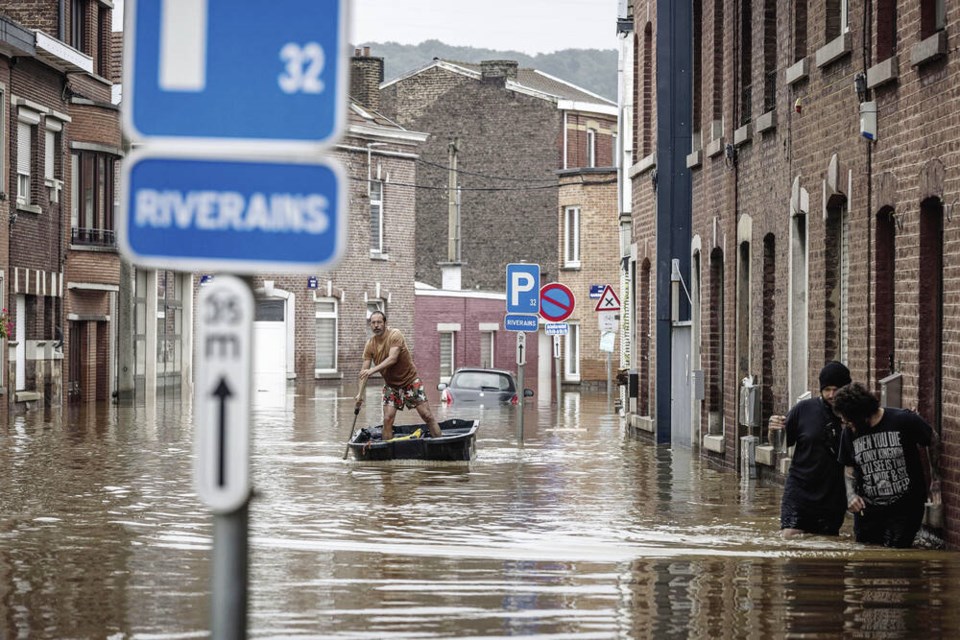I ended last week’s column with the admonition from Johan Rockstrom and his colleagues that “nothing less than a just global transformation … is required to ensure human well-being” and Thomas Homer Dixon’s observation, with reference just to climate change, that “our responses … must be far more radical than we’re currently envisioning. Incrementalism is now a waste of time and resources.”
Both Rockstrom — director of the Potsdam Institute for Climate Impact Research — and Homer Dixon — founder of the Cascade Institute at Royal Roads University — have been studying the issue of global change for many years and are respected leaders in this field.
They and many other leading researchers are growing increasingly concerned that we are approaching, if not already at, multiple tipping points for the climate, biodiversity loss and other key Earth systems.
I take their warnings very seriously, as should we all.
People like Rockstrom and Homer Dixon — and me for that matter — are often labelled “doomsayers,” as if that were some sort of negative characteristic. But stop and think for a moment.
If someone can see the possibility that speeding through the North Atlantic in the dark means there is a risk the Titanic will hit an iceberg, and recommends a more southerly route and slower speed, are they a doomsayer, or a prudent and prescient foreteller?
In fact, the real doomsayers are those who, if we follow what they say, will lead us to our doom. We had a splendid example of this just a couple of weeks ago, when Gwyn Morgan popped up on these pages yet again to condemn action to restrict fossil fuels, and to urge that Canada do nothing.
Of course, his judgement is suspect — biased and self-interested as it is — because he spent his career building up the fossil-fuel industry in Canada and now seems keen to protect his legacy.
But if we follow his advice, and the mix of half-truths, distortions and misdirection of much of the fossil fuel industry, Canada and the rest of the world will continue to blow through its carbon budget.
This will take us further down the path toward a planet with 2- 2.7 C of global heating. As it is, we are seeing what a mere 1.2 C of global heating can do, with climatologists expressing astonishment and concern at the rapidity and scale of temperature changes and their impacts.
Indeed, just a couple of weeks ago, UN Secretary General Antonio Guterres said “climate change is out of control.”
And as I noted last week, Rockstrom and his colleagues reported that we have already passed the safe and just boundary for seven of the eight Earth systems that they were looking at.
So we cannot continue to follow the advice of those who want us to bury our heads in the sand, ignoring our challenges and hoping they will go away, or that somehow technology will save us and allow “business as usual” to carry on.
It seems to me that the prudent thing governments need to do is to take seriously the work of these and other Earth system researchers and begin to take the radical steps towards a just global transformation that is needed.
That is particularly the case because, far from being doom-laden, the radical transformation that is called for will not only protect the Earth systems we depend upon for our wellbeing, indeed our very survival, but will actually lead to improved wellbeing and quality of life. It is not a path of sacrifice, but one of enhancement.
That transformation begins by recognizing that we only have one planet, that it is the only home of eight billion people, myriad other species and — as far as we currently know — the only life in the galaxy, perhaps in the universe.
So we have to learn to live within the physical and ecological constraints of our one planet, and do so in a way that is socially just for the present global population, for future generations and for other species.
So in the coming weeks, I will explore what such a just transformation looks like and what it will mean.
Dr. Trevor Hancock is a retired professor and senior scholar at the University of Victoria’s School of Public Health and Social Policy.
>>> To comment on this article, write a letter to the editor: [email protected]



